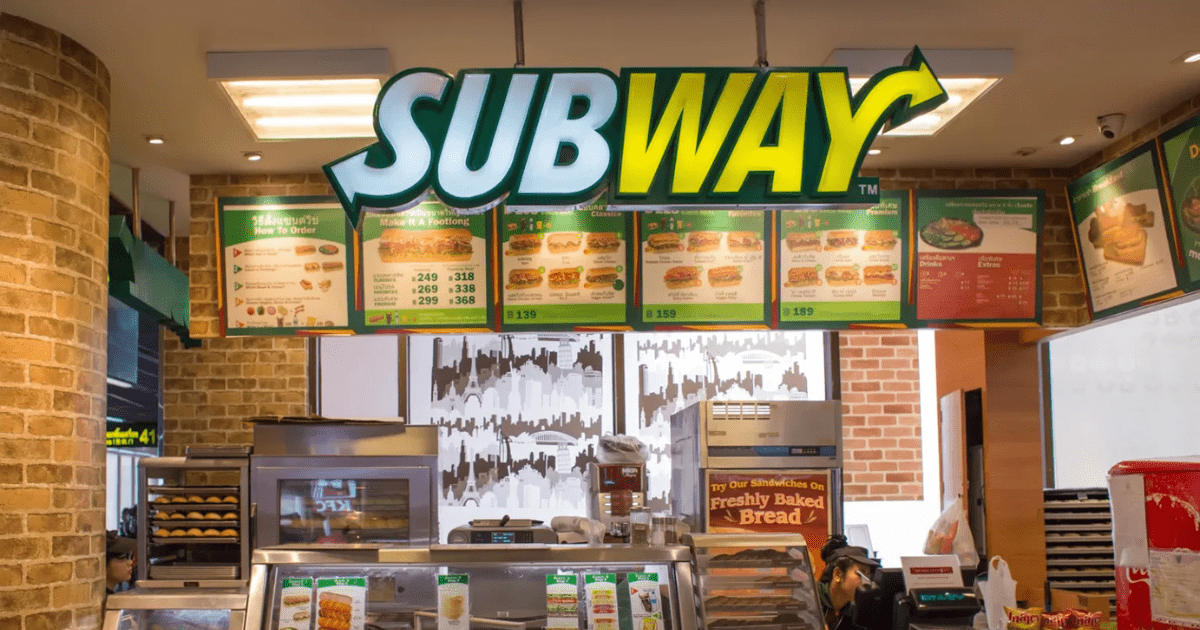Franchise Advantages: The Subway Case Study

Your thriving local business deserves to grow beyond its current walls. But if you’ve explored traditional expansion options, you’ve likely encountered a harsh reality: how do you scale without stretching yourself too thin? Just ask Subway. What started as a single sandwich shop in Connecticut evolved into the world’s largest restaurant chain (well, according to them… by location count), thanks to one powerful strategy – franchising.
The truth is, many small business owners find themselves trapped between growth ambitions and the limitations of their resources. You can’t be everywhere at once, and hiring managers who care enough about your business seems nearly impossible, right?
Most people don’t realize franchising offers a refreshingly different approach to scaling your business – one that preserves your brand’s integrity while minimizing your capital risk and operational burden. Throughout this guide, we’ll explore how this business model has helped brands like Subway transform from a single location into a global powerhouse.
How Franchising Transforms Traditional Business Growth
Successful business expansion requires more than just replicating your current operation in new locations. It demands a system that maintains quality, preserves your vision, and keeps delivering exceptional customer experiences, regardless of who’s running each location.
Traditional expansion forces entrepreneurs to stretch themselves thin across multiple fronts: securing suitable properties, hiring reliable managers, training new staff, and constantly monitoring performance. These demands often lead to quality inconsistencies and even burnout.
Franchising solves these challenges by creating a partnership between you (the franchisor) and other motivated entrepreneurs (your franchisees) who invest their own capital and commit to following your proven business model.
The Fundamental Shift in Business Expansion Mindset
As an owner of a business, it’s all on you. You take all the risk and have to seemingly multiple yourself to an impossible degree. When you franchise your business, you’re essentially pre-packaging your success formula for other, highly motivated entrepreneurs to use. Your operations, branding and marketing strategies, customer service approach, and brand standards all become a repeatable and powerful system that your franchisees can implement with your guidance. This creates several powerful advantages:
Capital Efficiency
Instead of investing your own funds to open new locations, franchisees provide the necessary capital for expansion. This significantly reduces your financial risk while accelerating your growth potential.
Owner-Operator Advantage
Unlike hired managers, franchisees have personal skin in the game. They’ve invested their savings and staked their future on your concept, creating an unmatched level of commitment and accountability.
Specialized Focus
As a franchisor, you can concentrate on improving systems, enhancing your brand, and training franchisees rather than managing daily operations across multiple locations.
Scalable Growth
Once your franchise system is established, you can expand far more rapidly than you could with company-owned locations. Your team develops expertise in onboarding new franchisees, allowing for efficient replication across markets.
This structural advantage explains why franchising has proven so effective across industries – from food and beverage to retail. This model creates natural alignment between the franchisor’s desire for brand growth and the franchisee’s entrepreneurial drive.
Subway’s Blueprint for Franchise Success
In 1965, Fred DeLuca borrowed $1,000 from friend and physicist Dr. Peter Buck to open “Pete’s Super Submarines” in Bridgeport, Connecticut. The early days were a struggle. It took a full eight years to build just 16 locations across parts of Connecticut. Soon after, Fred learned more about franchising and decided to shift strategies to accelerate growth without the burdens and massive capital investment they had been experiencing with the corporate locations.
The decision to franchise fundamentally changed Subway’s trajectory. By creating a standardized system that independent owners could implement, they achieved growth at a much faster pace. The first franchise location opened in 1974 and after a mere seven years, Subway boasted over 200 locations.
The System Behind Subway’s Franchise Success
Subway’s success didn’t materialize by accident. They developed sophisticated systems that enabled consistent execution across thousands of locations:
Standardized Operations
Every aspect of the business – from food preparation to customer service – was documented in comprehensive manuals and franchisee training programs.
Real Estate Expertise
Subway perfected the art of identifying high-traffic, low-cost locations that maximized franchisee profitability.
Supply Chain Management
Their centralized purchasing system ensured consistent ingredient quality while leveraging economies of scale to control costs.
Marketing Alignment
National advertising campaigns strengthened their franchise brand development efforts while local marketing initiatives helped individual franchisees connect with their communities.
Continuous Improvement
Subway consistently evolved their menu, store design, and operations based on franchisee feedback and market trends.
“The power of franchising isn’t just about replication – it’s about creating a network of committed partners who believe in your vision and execute with precision. That’s the formula that transformed Subway from a local sandwich shop into a global brand, and it’s the same approach we bring to every client.” — Chris Conner, President of FMS Franchise.

Building Your Franchise Infrastructure
A successful franchise system requires more than just a profitable business concept. It demands carefully designed infrastructure that enables consistent execution across locations while providing franchisees with the support they need to succeed. Subway’s franchise development provides valuable lessons for aspiring franchisors. They created comprehensive systems in several critical areas:
Training Systems
Effective knowledge transfer is essential for franchise success. Subway created a multi-faceted training approach that included:
- Initial Training: Comprehensive programs covering all aspects of operations
- Ongoing Development: Continuous education on new products and procedures
- Field Support: Regional teams to provide hands-on assistance
- Train-the-Trainer: Systems for franchisees to effectively train their staff
When you work with FMS, we help you develop training programs to maintain brand consistency while accommodating different learning styles and experience levels.
Quality Control Mechanisms
Maintaining consistent quality across locations requires systematic oversight. Subway implemented:
- Regular Inspections: Scheduled and surprise visits to verify standards
- Customer Feedback Systems: Mechanisms to collect and respond to guest experiences
- Performance Metrics: Data-driven evaluation of operational excellence
- Remediation Processes: Clear procedures for addressing any deficiencies
Marketing Support
Effective marketing is crucial for franchise success at both the brand and local levels. Subway created:
- National Brand Campaigns: Building overall awareness and positioning
- Local Store Marketing Tools: Customizable materials for individual locations
- Grand Opening Systems: Comprehensive launch strategies for new locations
- Digital Marketing Infrastructure: Website, social media, and online ordering platforms
Legal and Compliance Framework
Sound legal foundation is essential for protecting your brand and managing franchise relationships. Subway established:
- Franchise Disclosure Document (FDD): In compliance with the Federal Trade Commission’s Franchise Rule Compliance Guide, they developed a comprehensive legal document for prospective franchisees.
- Franchise Agreement: Clear contract defining rights and responsibilities
- Compliance Systems: Mechanisms to ensure regulatory adherence
- Intellectual Property Protection: Safeguards for trademarks and brand assets
Building these infrastructure elements requires expertise and experience. We specialize in developing customized systems that reflect your unique business model and values.
The Operational Reality
While the benefits of franchising are compelling, the daily reality of managing a franchise system requires different skills than running a single location. Understanding these operational shifts helps you prepare for successful franchise leadership.
The Franchisor’s Evolving Role
As you transition from business owner to franchisor, your focus shifts from direct customer interaction to franchisee support. Your primary customers become your franchisees, and your success increasingly depends on their performance. Subway’s leadership evolved through this transition by developing expertise in several key areas:
Franchisee Selection
They refined criteria to select the right franchisees – qualified candidates who aligned with their values and demonstrated the capabilities to succeed.
Relationship Management
They built communication channels and advisory councils to maintain productive partnerships with franchisees.
System Innovation
They continuously improved operations, products, and marketing based on market trends and franchisee feedback.
Performance Optimization
They developed metrics and benchmarking systems to help franchisees improve their results.
Subway’s Adaptive Advantage
One of Subway’s greatest strengths has been their ability to adapt their system to changing consumer preferences and market conditions. By having franchisees who live and work in their local markets, Subway was able to gather and implement locally-relevant feedback into their business model as needed and where appropriate. For example, when health consciousness became a major consumer trend, they positioned themselves as a fresh, healthier alternative to traditional fast food with their famous “Eat Fresh” campaign.
This adaptability extended to international markets as well. Subway modified their menu offerings to suit local tastes – vegetarian options in India, teriyaki-influenced sandwiches in Japan, and halal-certified ingredients in Muslim countries.
Again, the franchise model provided Subway the perfect structure for this balanced approach: standardized enough to maintain brand consistency but flexible enough to adapt to local markets and franchisee input. This combination of consistency and adaptability represents one of the most powerful examples for how franchising provides advantages for businesses with growth ambitions.

Common Questions About Franchising
Is my business suitable for franchising?
While many business types can succeed with franchising, the most suitable candidates share several characteristics:
- Proven Profitability: Consistent financial performance over time
- Systematic Operations: Processes that can be documented and taught
- Market Demand: Concept that appeals across multiple geographies
- Competitive Differentiation: Distinctive offering in your category
- Strong Brand Identity: Memorable, protected brand elements
Assess your specific business for franchise potential with our feasibility questionnaire!
What investment is required to franchise my business?
The cost to develop a franchise system must cover:
- Legal Documentation: FDD and franchise agreement preparation
- Operations Documentation: Comprehensive manuals and guides
- Training Development: Programs for knowledge transfer
- Marketing Materials: Franchise sales and support tools
- Technology Infrastructure: Systems for franchise management
While this represents a significant investment, it’s substantially less than the capital required to open multiple company-owned locations.
How many franchises can I reasonably expect to sell?
First-year franchise sales vary based on numerous factors. With effective franchise marketing and sales systems, many new franchisors are able to close good deals in their first year, with growth accelerating as the system proves successful. Finding a few early “friends and family” franchises who get reduced fees in return for intensive feedback on your operations implementation can go along way to not only ensuring smoother franchise deployment, but easier franchise sales early on.
Your Franchise Journey Starts Here
The franchise advantages we’ve explored – from capital-efficient growth to motivated owner-operators – have transformed countless businesses from local success stories into national and international brands. Subway’s journey from a single sandwich shop to the world’s largest restaurant chain by location count demonstrates the extraordinary potential of this expansion model.
Your business could follow a similar path with the right guidance and systems. At FMS Franchise, we specialize in helping successful business owners leverage these same franchise advantages to achieve their growth ambitions.
Take the first step toward transforming your business into a successful franchise system. Contact us today for a free consultation to discuss your specific business and growth objectives.
About the Author:
Chris Conner, President of FMS Franchise, brings over two decades of expertise in franchise development. Formerly Vice President at Francorp, he has worked with hundreds of franchise systems, specializing in franchise marketing, strategic planning, and system management. With a BS from Miami University and an MBA from DePaul University, Chris empowers business owners in the franchising process with tailored guidance and proven strategies. Connect with him on Linkedin.

